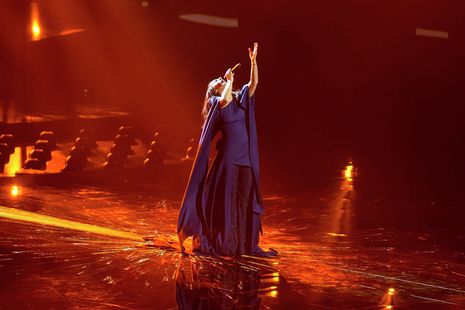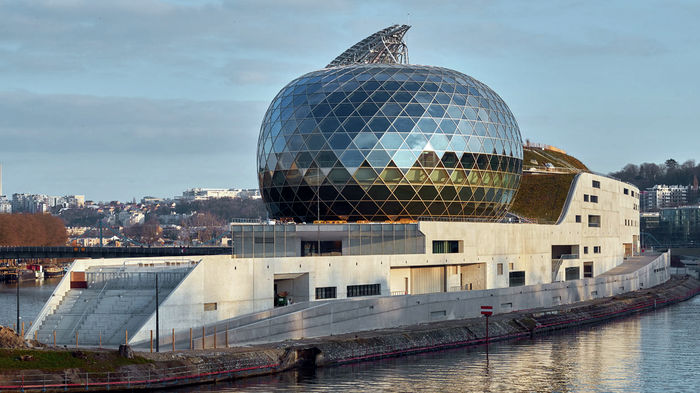Eurovision: Has Russia sung its last song?
Amy Moorhouse questions whether Russia’s exclusion from Eurovision could prove to be the end of the country’s political saga within the competition

In 2015, Russia’s entry to the Eurovision Song Contest was titled ‘A Million Voices’ — it was an anthem of peace, as the opening lyrics declared:
’We are the world’s people,
Different yet we’re the same,
We believe,
We believe in a dream,
Praying for peace and healing:
I hope we can start again’
They felt horrifically ironic after the events in Crimea in 2014 and even more so to a listener in 2022. As much as Vladimir Putin’s troubled relationship with Ukraine is not new, neither is politics in the Eurovision Song Contest, nor Russian-Ukrainian tensions manifesting themselves within the arena of the competition.
“The competition provides a vast stage for issues to be aired, with art and politics very much intertwined and interdependent, even if it isn’t always blindingly obvious”
The Eurovision Song Contest is intrinsically political and has been since its conception in 1956, as a method of uniting war-torn Western Europe. Despite the (EBU), European Broadcasting Union’s strictly apolitical stance, stating in its rules that “no lyrics, speeches, gestures of a political or similar nature shall be permitted”, politics still manifests itself in issues such as European identity, voting, and membership. With 183 million people tuning into the 2021 iteration of the contest, it provides a vast stage for issues to be aired, with art and politics very much intertwined and interdependent, even if it isn’t always blindingly obvious.
In other cases, however, it can be. In 2009, Georgia submitted a song that was titled ‘We Don’t Wanna Put In’, unsubtly alluding to the Russian leader, but it was rejected by the EBU. This entry was arguably a response to the 2008 Russo-Georgian war, in which Russia backed the self-proclaimed Republic of South Ossetia, effectively invading Georgia. The international community, however, did very little in response, and Eurovision was even hosted in 2009 by Moscow. The events in Georgia are today being viewed as an important template for Putin’s actions in Ukraine and the beginning of renewed Russian aggression.
The annexation of Crimea in 2014 attracted much greater international attention, but the tensions between Russia and Ukraine can be seen most clearly within the contest, during 2016. It was in 2016, that Jamala of Ukraine entered a song titled ‘1944’, which was about the mass deportation of the ethnic Tatar population of Crimea by Joseph Stalin. While Russia protested the song, it was cleared by the EBU, due to a loophole that it was historical not political. It would go on to not just compete, but win. The tensions surrounding the competition were heightened even more so by the fact that it finished ahead of the Russian entry ,‘You Are The Only One’, which had been the favourite, but eventually finished third.
The EBU reversed their decision to include Russia in the 2022 competition after receiving significant backlashTWITTER @EurovisionStatement from @EBU_HQ regarding Russia's participation in the Eurovision Song Contest 2022.https://t.co/HmKJdqVE4J pic.twitter.com/tVH6yFxzbq
- Eurovision Song Contest (@Eurovision) February 25, 2022
From this moment onwards, the contest has had to navigate multiple years of Russian-Ukrainian hostility. The following year when the contest was hosted in Kyiv, Russia’s chosen artist Yulia Samoylova was barred from entering Ukraine, as she had performed in Crimea. The Ukrainian authorities declared her travel an ‘illegal visit’, due to crossing via the Russian border. This caused controversy and the EBU, determined to maintain its apolitical position, even wrote to Ukraine’s Prime Minister arguing that banning a performer was unacceptable and warning there would be consequences for Ukraine’s future involvement in the show. Ultimately Russia withdrew, rejecting a proposal to perform virtually, and the competition continued. However, controversy persisted, exemplified by how in 2019, Ukraine’s selected artist Maruv withdrew, after national broadcasters set political conditions on her representation of Ukraine, in relation to Russia.
Ultimately the question is not whether politics is influencing the contest and its music, it always has, but why this time, in 2022, it feels different. While the EBU attempted to avoid the issue, initially signalling that Russia could continue to compete, in the name of fostering unity after their invasion of Ukraine, what was striking was the action of other countries. It was their show of solidarity with Ukraine, their refusal to compete unless Russia did not, that altered the issue and exerted enough pressure for a rapid U-turn, resulting in Russia being banned from participating.
Russia’s absence has the feeling of a far more permanent departure from the contest, all public Russian broadcasters have now announced their intention to withdraw from the EBU and the notion that there would be any desire to, or acceptance of, a Russian return currently feels implausible. Jamala, Ukraine’s most recent victor, has in recent days publicised her own terrifying effort to escape with her two young sons from the dangers of Kyiv, her experience mirroring the horror of so many. As the world condemns Putin’s regime, Russia’s ban on competing at Eurovision is symbolic of the depth and seeming permanence of an isolation that goes far beyond political sanctions, extending to the spheres of culture, sports and entertainment.
Looking to the contest in May, currently Ukraine’s odds of victory have soared, but while politics is intrinsic it is not absolute. Perhaps my favourite part of Eurovision is its ability to provide the unexpected — an artist may very well appear from nowhere and capture Europe’s attention. Meanwhile, any Russian hope ‘we can start again’, in this current moment, feels incredibly remote but Europe will certainly continue to hope for peace.
 News / Eight Cambridge researchers awarded €17m in ERC research grants27 December 2025
News / Eight Cambridge researchers awarded €17m in ERC research grants27 December 2025 News / Downing investigates ‘mysterious’ underground burial vault 29 December 2025
News / Downing investigates ‘mysterious’ underground burial vault 29 December 2025 Lifestyle / Ask Auntie Alice29 December 2025
Lifestyle / Ask Auntie Alice29 December 2025 Sport / Hard work, heartbreak and hope: international gymnast Maddie Marshall’s journey 29 December 2025
Sport / Hard work, heartbreak and hope: international gymnast Maddie Marshall’s journey 29 December 2025 Interviews / Meet Juan Michel, Cambridge’s multilingual musician29 December 2025
Interviews / Meet Juan Michel, Cambridge’s multilingual musician29 December 2025









